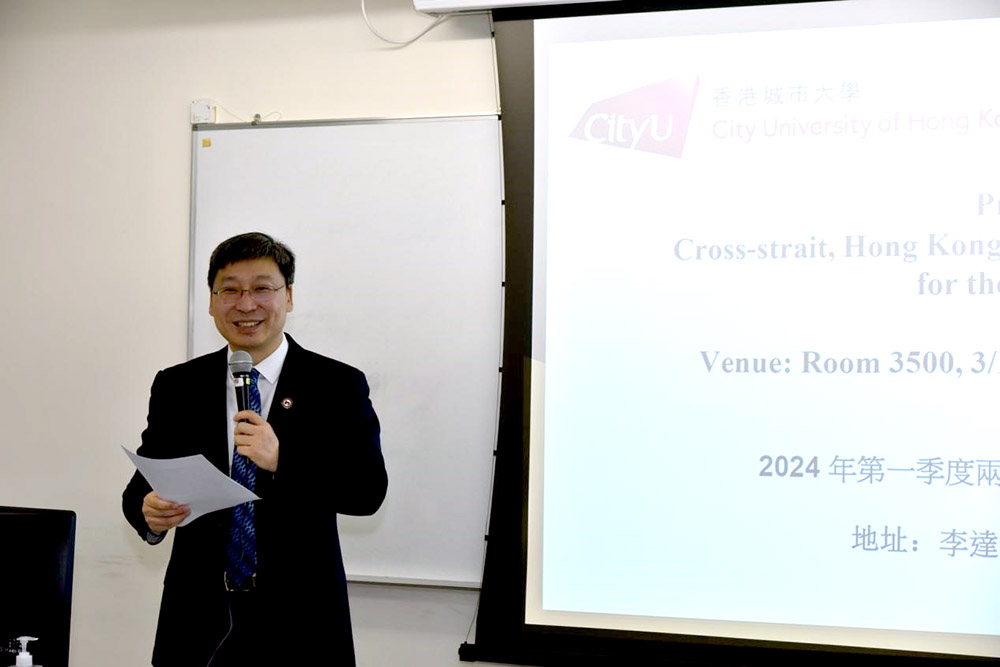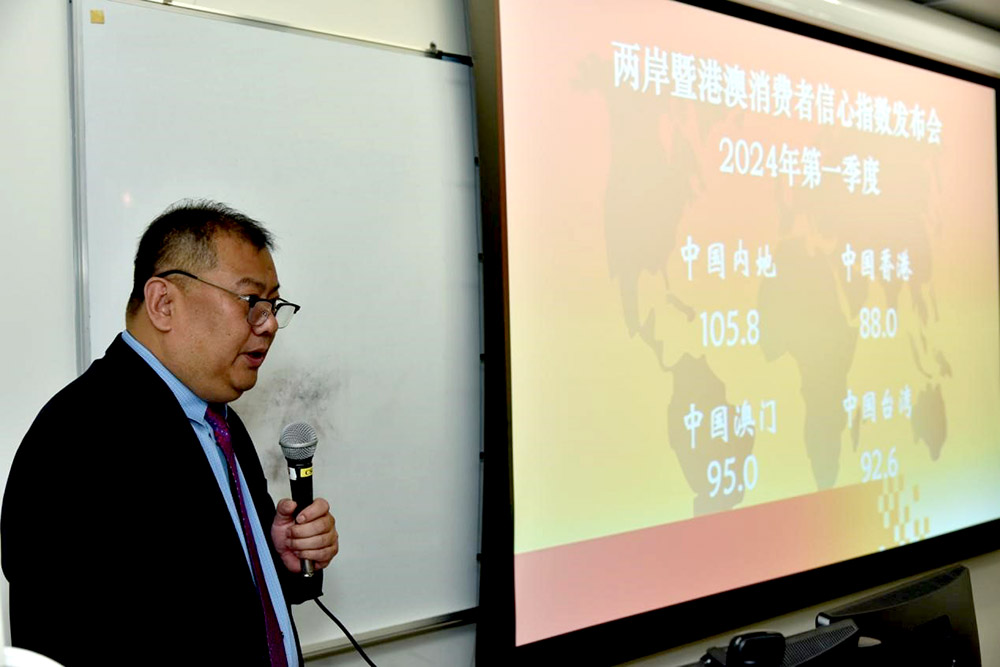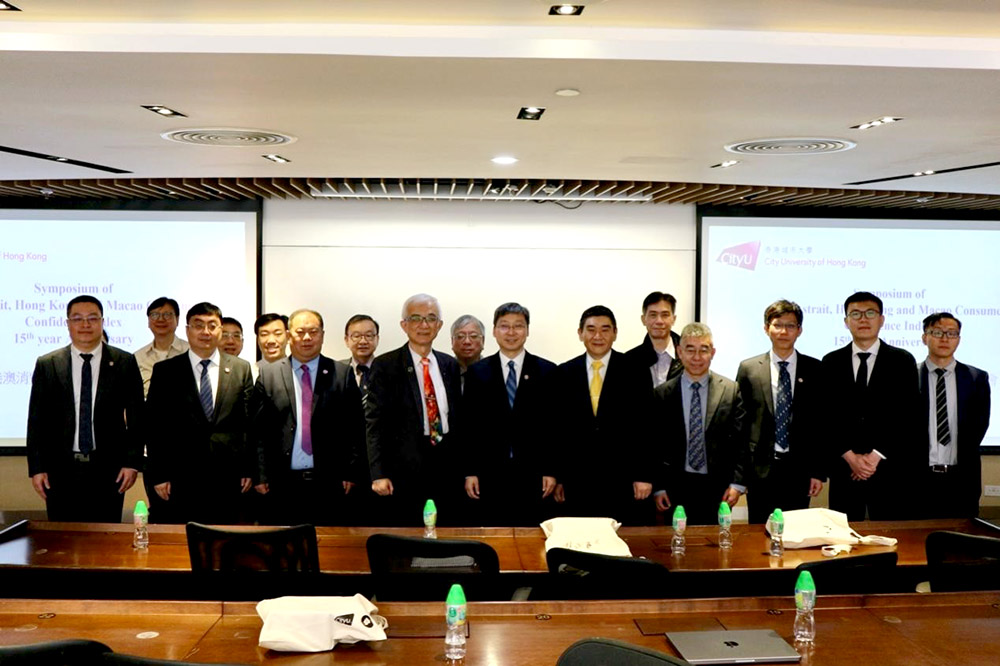President Wu Weixing Attends Press Conference on CCI of Chinese Mainland, Taiwan, HK and Macao
On April 8, a press conference was convened at the Liu Mingwei Building of City University of Hong Kong (CityUHK) to announce the findings of the “2024 Consumer Confidence Index (CCI) of the Chinese Mainland, Taiwan, HK, and Macao for the First Quarter”. The conference was jointly organized by CUEB, CityUHK, Macau University of Science and Technology (MUST), and Fu Jen Catholic University (FJU).
Among the notable attendees were Wu Weixing, CUEB President Xie Bangchang, Vice President of FJU, Wen Zijian, head of the HK Statistical Society, Director of the Department of Management Sciences of CityUHK, Cao Guohui, Director of the Statistical Consulting Unit of CityUHK, Liu Chengkun, Director of the MUST’s Institute for Sustainable Development, experts from four universities, and teachers and students of CityUHK. The event garnered coverage from various media outlets, including Taiwan News, CRI Online, Sina.com, Net Ease News, Tencent News, Ta Kung Pao, Hong Kong Economic Times, and Journal Va Kio. The conference was presided over by Ruan Jing, member of the Expert Committee of China Consumers Association (CCA), Deputy Dean of the CUEB’s School of Data Science.

On behalf of CUEB and the Index Research Team, Wu extended his warm welcome and heartfelt gratitude to the participants. He highlighted the significance of CCI in today’s intricate and dynamic global economy. As a pivotal economic indicator, the CCI integrates academic research with real-world application, offering insights into consumers’ expectations and confidence in future economic performance. Moreover, it serves as a guiding light for macro-economy and financial market, providing a basis for decision-making across various sectors, including enterprises, government, and society at large. This conference coincides with the 15th anniversary of the establishment of the CCI of Chinese mainland, Taiwan, Hong Kong and Macao. Over the years, they have achieved fruitful achievements in CCI research, fostering regional cooperation and exchange. It has played a significant role in fostering the stability and prosperity of the regional economy while contributing to the broader goals of national rejuvenation and the comprehensive advancement of China’s modernization efforts.

Xie Bangchang and Wen Zijian highlighted in their speeches that the index serves as a fundamental measure for assessing the socio-economic development of the four regions, and has emerged as a leading indicator of macroeconomic development.

Zhang Baoxue, Dean of the School of Statistics of CUEB, announced the index: the CCI for the Chinese mainland was 105.8, up 3.5 year-on-year; the CCI for HK was 88.0, up 1.4 year-on-year; the CCI for Macao was 95.0, down 6.7 year-on-year; and the CCI for Taiwan was 92.6, up 0.2 year-on-year. Ren Tao, Dean of the School of Business of CUEB, Cao Guohui, Liu Chengkun, and Xie Bangchang analyzed the index and answered questions from the media.


Before the conference, the four universities jointly organized “the 15th Anniversary Forum for CCI of Chinese Mainland, Taiwan, HK and Macao”. Experts, along with Chen Jiale, the Dean of the College of Business of CityUHK, reviewed its history and outcomes. They also discussed strategies to improve the index compilation, innovate data collection technologies, promote the transformation and utilization of the findings, and enhance its academic impact.

Background
The CCI serves as a comprehensive indicator of consumers’ views on the current economic performance, including their subjective perceptions of the macro-economy, employment, price level, living standard, home purchase, and share investment at present and in the next three months. It is often used as a leading indicator for predicting economic and consumption trends.
Since its initial launch by CUEB, CityUHK, MUST, and FJU in the first quarter of 2009 in Beijing, the CCI has been released every three months.
Over the past 15 years, the four universities’ research teams have continuously monitored and offered timely feedback on consumer confidence in the four regions. Through collaborative efforts, they have gradually developed the index into a globally recognized brand with visibility and influence.
